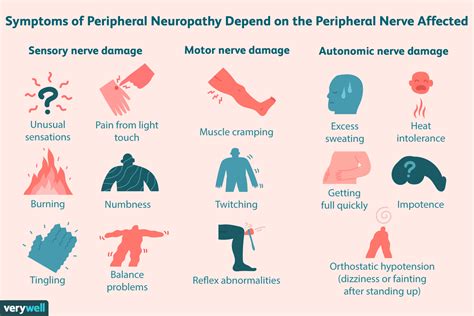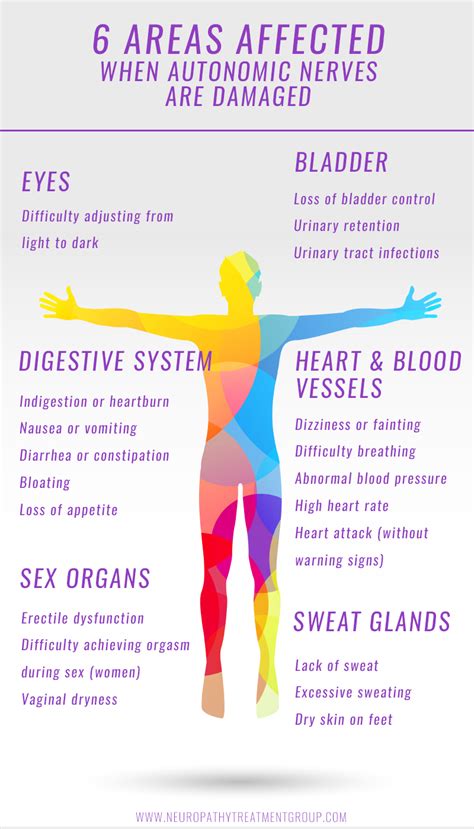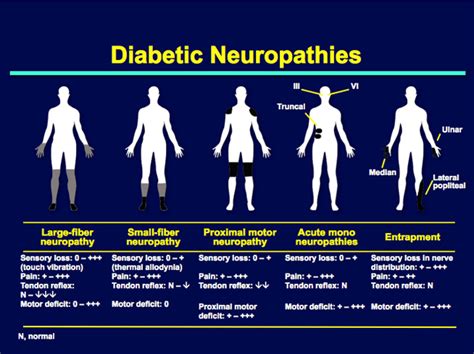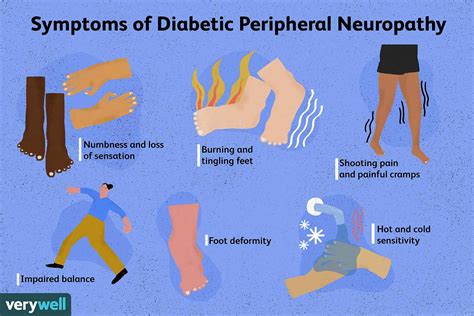Intro
Discover how diabetic neuropathy affects overall health, causing nerve damage, numbness, and pain, impacting mobility, balance, and mental well-being, and increasing risk of infections and amputations, with 5 key ways to manage symptoms.
Diabetic neuropathy is a serious and common complication of diabetes that affects millions of people worldwide. It occurs when high blood sugar levels damage the nerves, leading to a range of symptoms that can significantly impact a person's quality of life. From numbness and tingling in the feet and hands to digestive problems and sexual dysfunction, the effects of diabetic neuropathy can be far-reaching and debilitating. In this article, we will explore the ways in which diabetic neuropathy can impact health, highlighting the importance of early diagnosis, effective management, and lifestyle changes to mitigate its effects.
The prevalence of diabetic neuropathy is a significant concern, with studies suggesting that up to 50% of people with diabetes will develop some form of nerve damage over their lifetime. This can have a profound impact on daily life, making everyday activities such as walking, eating, and even sleeping a challenge. Furthermore, diabetic neuropathy can increase the risk of falls, injuries, and infections, which can lead to more severe health complications. As such, it is essential to understand the ways in which diabetic neuropathy can impact health and take proactive steps to prevent or manage its effects.
Diabetic neuropathy is a complex condition that can affect various parts of the body, including the peripheral nerves, autonomic nerves, and proximal nerves. The symptoms of diabetic neuropathy can vary widely, depending on the type and severity of nerve damage. Some people may experience mild symptoms, such as numbness or tingling in the feet, while others may suffer from more severe symptoms, such as chronic pain, weakness, or paralysis. Understanding the different types of diabetic neuropathy and their effects on health is crucial for developing effective treatment plans and improving quality of life.
Peripheral Neuropathy and Its Effects on Mobility

The effects of peripheral neuropathy on mobility can be significant, making everyday activities such as walking, running, or even standing for long periods a challenge. This can lead to a decline in physical fitness, increased risk of obesity, and reduced overall health and well-being. Moreover, peripheral neuropathy can also affect balance and coordination, increasing the risk of falls and injuries. As such, it is essential to take proactive steps to manage peripheral neuropathy, including regular exercise, foot care, and lifestyle changes to mitigate its effects.
Managing Peripheral Neuropathy
Managing peripheral neuropathy requires a comprehensive approach that includes lifestyle changes, medical treatment, and regular monitoring. This can include: * Regular exercise, such as walking or swimming, to improve mobility and reduce pain * Foot care, including daily inspections and proper footwear, to prevent injuries and infections * Healthy eating, including a balanced diet rich in fruits, vegetables, and whole grains, to manage blood sugar levels * Stress management, including techniques such as meditation or yoga, to reduce stress and anxiety * Medical treatment, including medications such as pain relievers or antidepressants, to manage symptoms and slow disease progressionAutonomic Neuropathy and Its Effects on Bodily Functions

The effects of autonomic neuropathy on bodily functions can be significant, making everyday activities such as eating, drinking, or even sleeping a challenge. This can lead to a decline in overall health and well-being, increased risk of infections, and reduced quality of life. Moreover, autonomic neuropathy can also affect emotional and mental health, leading to anxiety, depression, and stress. As such, it is essential to take proactive steps to manage autonomic neuropathy, including lifestyle changes, medical treatment, and regular monitoring.
Managing Autonomic Neuropathy
Managing autonomic neuropathy requires a comprehensive approach that includes lifestyle changes, medical treatment, and regular monitoring. This can include: * Eating small, frequent meals to manage gastrointestinal problems * Avoiding triggers, such as certain foods or stress, that can exacerbate symptoms * Practicing relaxation techniques, such as deep breathing or meditation, to reduce stress and anxiety * Engaging in regular exercise, such as walking or swimming, to improve overall health and well-being * Seeking medical treatment, including medications or therapy, to manage symptoms and slow disease progressionProximal Neuropathy and Its Effects on Muscle Strength

The effects of proximal neuropathy on muscle strength can be significant, making everyday activities such as walking, running, or even standing for long periods a challenge. This can lead to a decline in physical fitness, increased risk of obesity, and reduced overall health and well-being. Moreover, proximal neuropathy can also affect balance and coordination, increasing the risk of falls and injuries. As such, it is essential to take proactive steps to manage proximal neuropathy, including lifestyle changes, medical treatment, and regular monitoring.
Managing Proximal Neuropathy
Managing proximal neuropathy requires a comprehensive approach that includes lifestyle changes, medical treatment, and regular monitoring. This can include: * Engaging in regular exercise, such as physical therapy or resistance training, to improve muscle strength and mobility * Practicing good posture and body mechanics to reduce strain on muscles and joints * Managing pain, including medications or alternative therapies, to improve overall quality of life * Seeking medical treatment, including medications or therapy, to manage symptoms and slow disease progressionFocal Neuropathy and Its Effects on Specific Nerves

The effects of focal neuropathy on specific nerves can be significant, making everyday activities such as reading, driving, or even communicating a challenge. This can lead to a decline in overall health and well-being, increased risk of accidents, and reduced quality of life. Moreover, focal neuropathy can also affect emotional and mental health, leading to anxiety, depression, and stress. As such, it is essential to take proactive steps to manage focal neuropathy, including lifestyle changes, medical treatment, and regular monitoring.
Managing Focal Neuropathy
Managing focal neuropathy requires a comprehensive approach that includes lifestyle changes, medical treatment, and regular monitoring. This can include: * Practicing good eye care, including regular eye exams and proper glasses or contact lenses, to manage vision problems * Engaging in regular exercise, such as physical therapy or speech therapy, to improve muscle strength and mobility * Managing pain, including medications or alternative therapies, to improve overall quality of life * Seeking medical treatment, including medications or therapy, to manage symptoms and slow disease progressionDiabetic Neuropathy and Its Effects on Mental Health

The effects of diabetic neuropathy on mental health can be significant, making everyday activities such as sleeping, eating, or even socializing a challenge. This can lead to a decline in overall health and well-being, increased risk of mental health disorders, and reduced quality of life. As such, it is essential to take proactive steps to manage diabetic neuropathy, including lifestyle changes, medical treatment, and regular monitoring.
Managing Diabetic Neuropathy and Mental Health
Managing diabetic neuropathy and mental health requires a comprehensive approach that includes lifestyle changes, medical treatment, and regular monitoring. This can include: * Practicing relaxation techniques, such as deep breathing or meditation, to reduce stress and anxiety * Engaging in regular exercise, such as walking or swimming, to improve overall health and well-being * Seeking social support, including friends, family, or support groups, to manage emotional and psychological burden * Seeking medical treatment, including medications or therapy, to manage symptoms and slow disease progressionWhat are the symptoms of diabetic neuropathy?
+The symptoms of diabetic neuropathy can vary widely, depending on the type and severity of nerve damage. Common symptoms include numbness, tingling, burning, and pain in the feet, legs, hands, and arms. Other symptoms may include muscle weakness, cramping, and spasms, as well as gastrointestinal, urinary, and sexual problems.
How is diabetic neuropathy diagnosed?
+Diabetic neuropathy is typically diagnosed through a combination of physical examination, medical history, and diagnostic tests. These may include nerve conduction studies, electromyography, and blood tests to check for underlying conditions such as diabetes or vitamin deficiencies.
Can diabetic neuropathy be prevented or reversed?
+While diabetic neuropathy cannot be completely prevented or reversed, early diagnosis and treatment can help manage symptoms and slow disease progression. Lifestyle changes, such as regular exercise, healthy eating, and stress management, can also help mitigate the effects of diabetic neuropathy.
What are the treatment options for diabetic neuropathy?
+Treatment options for diabetic neuropathy depend on the type and severity of nerve damage, as well as the individual's overall health and medical history. Common treatments include medications such as pain relievers or antidepressants, physical therapy, and lifestyle changes such as regular exercise and healthy eating.
How can I manage diabetic neuropathy and improve my quality of life?
+Managing diabetic neuropathy and improving quality of life requires a comprehensive approach that includes lifestyle changes, medical treatment, and regular monitoring. This can include practicing relaxation techniques, engaging in regular exercise, seeking social support, and seeking medical treatment to manage symptoms and slow disease progression.
In summary, diabetic neuropathy is a serious and common complication of diabetes that can have a significant impact on health and quality of life. Understanding the different types of diabetic neuropathy, their symptoms, and treatment options is crucial for managing the condition and improving overall health and well-being. By taking proactive steps to manage diabetic neuropathy, individuals can reduce their risk of complications, improve their quality of life, and live a healthier, happier life. We encourage readers to share their experiences and tips for managing diabetic neuropathy, and to seek medical attention if they are experiencing any symptoms or concerns. Together, we can work towards a better understanding and management of this complex condition.
